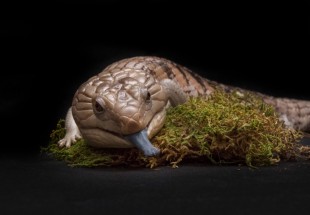
Northern Blue-tongued Skink
The Northern blue-tongued skink is a medium-sized lizard endemic to New Guinea and Northern and Eastern Australia. It is named for its long blue tongue, which is believed to be a defense mechanism used to scare predators.
Range & Habitat
Semi-desert, scrubland and mixed woodland areas of Northern and Eastern Australia and New Guinea.
At the Zoo, our blue-tongued skinks are outreach animals that appear in zoo education programs.
Conservation Status: Least Concern
Diet
In the Wild: Insects, snails, fruits, berries, wildflowers and carrion.
At the Zoo: Fruit, greens, cockroaches, crickets, superworms, mealworms and Mazuri reptile pellets.
Life Span
In Human Care: 18-20 years.
Fun Facts about the Northern Blue-tongued Skink
- The Northern blue-tongued skink can shed its tail to escape predators and then re-grow it.
- When frightened, it will puff up its body, stick out its long, blue tongue and hiss to scare predators.
- Skinks are shy and seldom stray from their shelter. They are not very agile and the animals they eat are mostly slow moving.
- Although they technically "hatch" from eggs, they do so inside the mother's body and are then "born" alive.
- Some biologists think that the blue-tongued skink has adapted to mimic the venomous death adder, a snake that shares its range in Australia. Its head shape and coloration resemble the death adder's, so a quick look may be enough to send predators in the other direction.
Sources
The Lehigh Valley Zoo. December 2020. https://www.lvzoo.org/animals/blue-tongued-skink/
San Diego Zoo website: https://kids.sandiegozoo.org/animals/blue-tongued-skink
The Buffalo Zoo: https://buffalozoo.org/animal/northern-blue-tongued-skink/


